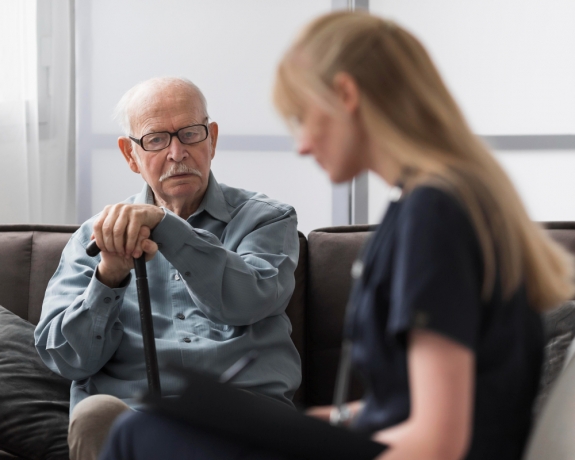As our loved ones age, they deserve dignity, respect, and attentive care. Unfortunately, elder abuse remains an often-overlooked issue that affects millions of seniors around the world. It can happen anywhere, in nursing homes, assisted living facilities, or even within family homes. The challenge is that abuse is rarely apparent. It hides behind polite smiles, subtle behavioral changes, and unexplained injuries.
For families, the key is awareness. Understanding the hidden signs of elder abuse can mean the difference between continued suffering and timely intervention.
Understanding Elder Abuse
Elder abuse refers to any act, or lack of appropriate action, that causes harm or distress to an older person. This harm can be physical, emotional, financial, sexual, or neglectful in nature. Often, the abuser is someone the senior depends on for care or companionship.
According to the World Health Organization, nearly one in six people aged 60 and older experience some form of abuse in community settings. Yet experts believe the number is much higher because many cases go unreported.
Recognizing that elder abuse can take many forms is the first step toward stopping it.
Common Types of Elder Abuse
Each type of abuse manifests differently, but all can leave lasting emotional and physical scars.
1. Physical Abuse
Physical abuse includes hitting, pushing, restraining, or misusing medication to control a senior’s behavior. Unexplained bruises, burns, or repeated hospital visits may be warning signs.
2. Emotional or Psychological Abuse
Emotional abuse can be verbal threats, humiliation, isolation, or manipulation. When a once-cheerful elder becomes withdrawn or anxious, emotional mistreatment could be the cause.
3. Neglect
Neglect happens when caregivers fail to meet basic needs such as food, hygiene, medical care, or social interaction. Signs may include malnutrition, untreated conditions, or unsanitary living conditions.
4. Financial Exploitation
Financial abuse involves stealing money, forging signatures, or coercing elders into changing wills or financial documents. A sudden change in banking patterns or unpaid bills could raise red flags.
5. Sexual Abuse
Though deeply disturbing, sexual abuse does occur in senior populations. It includes unwanted touching or any non-consensual sexual act. Indicators might include unexplained infections, bruising, or a change in demeanor.
The Hidden Signs You Might Miss
Abuse often thrives in silence. Many older adults don’t speak up because they fear retaliation, embarrassment, or losing their independence. This makes it crucial for families to stay alert to subtle cues, not just the obvious ones.
1. Changes in Personality or Mood
A once talkative loved one who suddenly avoids conversation or social contact could be signaling distress.
2. Frequent Hospital Visits or Injuries with Weak Explanations
Recurrent trips to the ER or bruises that the senior dismisses as "accidents" may be signs of something more serious.
3. Withdrawal from Favorite Activities
If your loved one no longer enjoys hobbies they once loved, emotional manipulation or fear might be keeping them quiet.
4. Unexplained Financial Activity
Sudden ATM withdrawals, missing valuables, or new credit accounts could indicate financial exploitation.
5. Poor Hygiene or Malnutrition
Neglect often reveals itself through unkempt appearances, dirty bedding, or dramatic weight loss.
Why Elder Abuse Often Goes Unreported
Even when abuse is suspected, it can be hard to prove or confront. Seniors may:
- Fear of losing their caregiver or being placed in a facility.
- Feel ashamed or blame themselves for the mistreatment.
- Have cognitive impairments like dementia that limit their ability to explain what’s happening.
- Believe no one will believe them.
That’s why family vigilance and advocacy play such an essential role. A compassionate approach can make it easier for seniors to open up about what they’re experiencing.
Emotional and Physical Impact on Seniors
The effects of elder abuse extend far beyond visible injuries. Victims often suffer from:
- Depression and anxiety from prolonged mistreatment.
- Worsening chronic illnesses due to stress and neglect.
- Loss of trust in family members or caregivers.
- Premature mortality, as studies show, elder abuse increases the risk of early death.
In short, the impact of abuse is both immediate and long-lasting, which is why early detection matters so much.
How Families Can Step In
Recognizing the signs is only the beginning. The next step is taking action to protect your loved one and ensure they receive the care they deserve.
1. Communicate Regularly
Stay in touch through visits, phone calls, or video chats. The more connected you are, the easier it becomes to notice changes in mood or behavior.
2. Build Relationships with Caregivers
Establish open communication with caregivers, nurses, or facility staff. Regular check-ins can discourage potential abusers and foster accountability.
3. Trust Your Instincts
If something feels wrong, it probably is. Don’t dismiss your intuition. Investigate gently but promptly.
4. Keep Documentation
Record injuries, unusual transactions, or statements that raise concern. This evidence can be critical when reporting or proving abuse.
5. Know Your Legal Options
Families often hesitate to act because they don’t know where to start. Fortunately, there are steps to take if you suspect elder abuse that can help guide you through the process of reporting, documenting, and proving your case legally.
Seeking Professional Help
If you believe your loved one is being mistreated, you don’t have to handle it alone. Reach out to:
- Adult Protective Services (APS): They investigate reports of elder abuse and can connect you to resources.
- Law enforcement: For cases involving physical harm or financial exploitation, filing a police report is essential.
- Geriatric care managers or social workers: These professionals can assess your loved one’s living situation and recommend safer alternatives.
- Legal advocates: Attorneys specializing in elder law can help families navigate complex reporting and protection systems.
Preventing Elder Abuse Before It Happens
While intervention is vital, prevention is even better. Families can take proactive steps to reduce the risk of abuse:
1. Vet Caregivers Thoroughly
Always perform background checks and request references before hiring caregivers or choosing care facilities.
2. Encourage Independence
Seniors who remain socially and physically active are less likely to become isolated or dependent, two key risk factors for abuse.
3. Maintain Financial Oversight
Offer assistance with bill payments, budgeting, or setting up automatic deposits. Transparency prevents financial exploitation.
4. Educate Your Loved Ones
Talk openly about abuse, scams, and boundaries. Empowering seniors to recognize red flags can reduce vulnerability.
Addressing Abuse in Care Facilities
If your loved one resides in a nursing home or assisted living facility, stay involved. Attend care meetings, visit unannounced when possible, and observe how staff interact with residents.
Warning signs within facilities may include:
- High staff turnover.
- Unexplained injuries or frequent use of restraints.
- Residents appear sedated or fearful.
- Dirty or unsafe living conditions.
When issues arise, document your observations and escalate concerns to administrators or local authorities. Remember, your vigilance is your loved one’s best protection.
Supporting an Elder After Abuse
Healing after abuse takes time, patience, and compassion. Support your loved one by:
- Listening without judgment. Let them share their story when they’re ready.
- Reassuring their safety. Help them feel secure in their new environment.
- Encouraging counseling. Professional support can ease trauma and restore confidence.
- Celebrating small milestones. Every sign of recovery, from improved mood to new routines, is progress worth acknowledging.
A Call to Compassion and Awareness
Elder abuse is a hidden epidemic that can touch any family. But it doesn’t have to go unnoticed. By staying vigilant, asking questions, and acting when something feels wrong, families can become the first line of defense against mistreatment.
Every senior deserves to age with dignity, surrounded by care and respect. Raising awareness, fostering communication, and taking action aren’t just preventive measures; they’re acts of love and humanity.
Final Thoughts
Protecting older adults is about more than safety; it’s about compassion and connection. If you suspect mistreatment, don’t wait. Educate yourself, gather information, and take those first critical steps toward ensuring your loved one’s safety and well-being. In doing so, you stand not only as their advocate but also as a guardian of dignity and respect for all older adults.






